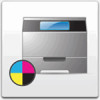Lexmark Color Laser Connectivity guide - Page 1
Lexmark Color Laser Manual
 |
View all Lexmark Color Laser manuals
Add to My Manuals
Save this manual to your list of manuals |
Page 1 highlights
Connectivity guide Page 1 of 6 Connectivity guide Windows instructions for a locally attached printer Note: When installing a locally attached printer, if the operating system is not supported by the Software and Documentation CD, the Add Printer Wizard must be used. Updates for the printer software may be available on the Lexmark Web site at www.lexmark.com. What is local printing? Local printing is printing to a locally attached printer (a printer that is connected directly to your computer with a USB or parallel cable). When setting up this type of printer with a USB cable, you should install the printer software before connecting the USB cable. For more information, see the setup documentation. The Software and Documentation CD can be used to install the necessary printer software on most Windows operating systems. Installing software using the CD Using the Software and Documentation CD, you can install printer software for the following operating systems: • Windows Vista • Windows Server 2003 and Windows Server 2003 x64 • Windows XP and Windows XP x64 bit Edition • Windows 2000 • Windows Me • Windows NT 4.0 • Windows 98 Second Edition (USB not supported) 1 Insert the Software and Documentation CD. If the install screen does not appear, click Start Œ Run, and then type D:\setup.exe, where D is the letter of your CD-ROM drive. 2 Select Install Printer and Software. 3 Select Suggested, and then click Next. 4 Select Local Attach, and then click Next. The printer software is copied to your computer. 5 Connect the USB or parallel cable, and then turn on the printer. The Plug and Play screen appears, and a printer object is created in the Printers folder. Installing software using the Add Printer Wizard You can install printer software for the following operating systems: • Windows 98 First Edition (USB not supported) • Windows 95 (USB not supported) 1 Insert the Software and Documentation CD. If the CD automatically starts, click Exit. 2 Click Start Œ Settings Œ Printers, and then click Add Printer to start the Add Printer Wizard. 3 When prompted, select to install a local printer, and then click Have Disk.









